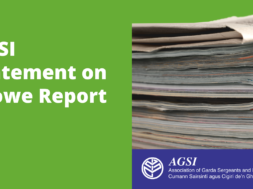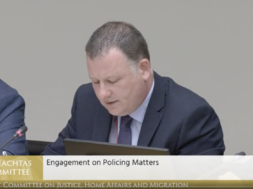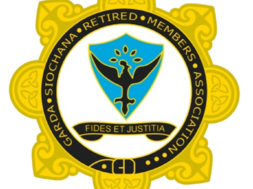CHECK AGAINST DELIVERY
Industrial Relations (Members of the Garda Síochána and the Defence Forces) Bill 2015
Second Stage Speech by Aodhán O Ríordáin,
Minister of State at the Department of Justice and Equality
Friday 24th April, 2015
Ceann Comhairle
On behalf of the Minister for Justice and Equality, and also the Minister for Defence, I welcome the opportunity to respond to the Industrial Relations (Members of the Garda Síochána and the Defence Forces) Bill 2015 which has been introduced by Deputy Michael McNamara.
Unfortunately neither the Minster for Justice and Equality nor the Minister for Defence can be here today to address the House due to a prior engagement elsewhere.
This Bill forms part of a broader current debate on the future of the industrial relations architecture in the Garda Síochána and the Defence Forces.
In that regard, this second stage debate allows for a timely discussion on this matter and the various sensitivities and complexities which arise. I wish to thank Deputy McNamara for giving us this opportunity for debate. I would add that while it is important that we discuss such important matters in this House, I am sure Deputies on all sides will recognise that debate and dialogues must also be had at other levels, particularly with the parties involved including the various Garda and Defence Forces staff representative bodies. This is a process which is underway and will continue. The points raised in this debate today will inform that broader process of consideration.
Current arrangements for the Garda Síochána
At the outset, in debating these issues, it is important to understand the existing arrangements for industrial relations in the Garda Síochána and the Defence Forces, and let me deal first with the Garda Síochána.
Section 18 of the Garda Síochána Act 2005 provides for the establishment, in accordance with regulations, of Garda Associations for the purpose of representing members of the Garda Síochána below the rank of Assistant Commissioner in all matters affecting their welfare and efficiency. This includes pay, pensions and conditions of service. A similar provision for Garda Associations was in previous Garda legislation going back to 1923.
Regulations establishing the Garda Representative Association, the Association of Garda Sergeants and Inspectors, the Association of Garda Superintendents and the Association of Chief Superintendents have been in place for a number of years.
As Deputies will be aware, Minister Fitzgerald has addressed or is yet to address the conferences of some of these various associations. This is in addition to the very positive constructive engagement between the Minister and the Associations, which has included a substantial number of meetings over the past year which included discussions on a broad range of issues. I know the Minister has welcomed this engagement, both in terms of allowing important discussion of IR issues but also providing a forum for feedback on key policing practices issued from frontline Gardaí and local managers.
In terms of Garda Associations associating with a body outside the Garda Síochána, it should be noted that a general prohibition exists in Section 18 of the 2005 Act. While this prohibition is the default position, it is important to note that the Minister for Justice and Equality may, notwithstanding this, authorise an association with an outside body, and in doing so may specify conditions or restrictions in relation to such an authorisation.
Currently, in effect, Garda Associations may not associate with the Irish Congress of Trade Unions or any other umbrella body for employees. Instead, the Garda Associations represent their members’ interests in negotiations on terms and conditions at the Garda Conciliation and Arbitration Council. In addition to this formal process, there is a less formal partnership process in place in the Garda Síochána which manages industrial relations issues at a local level and where possible settles these issues before the need arises to present them formally at the Conciliation Council.
In relation to the right to strike, while there is no single specific prohibition on striking by members of the Garda Síochána, a combination of provisions in law, including the Industrial Relations Act 1990, as well as Garda discipline regulations, effectively precludes strikes.
In relation to central pay talks, the Garda Associations, because they have not been authorised to associate with the Irish Congress of Trade Unions, have in the past not been represented by the Public Service Committee of the ICTU in such talks. Instead, parallel bi-lateral discussions have been held with the Garda Associations, and indeed the Defence Forces Associations.
Haddington Road review of the Garda Síochána
A Cheann Comhairle, those are the current industrial relations arrangements for the Garda Síochána. Importantly, however, the House will wish to note that there is a review of the Garda Síochána currently under way, under the Haddington Road Agreement, and this review encompasses “the appropriate structures and mechanisms for the resolution of matters relating to pay, industrial relations and attendance matters.” I will return to this point later if I may.
Findings of European Committee of Social Rights
The impetus for this Bill, or at least the Garda-related parts of the Bill, is a finding last year by the European Committee of Social Rights – a Council of Europe body – that three aspects of the current arrangements are not in compliance with the European Social Charter.
The three aspects are:
the prohibition on Garda representative associations joining national employees’ organisations;
the restricted access of Garda representative associations into pay agreement discussions;
the prohibition of the right to strike of members of the Garda Síochána.
The Bill seeks to respond to these findings –
· by providing a right for Garda, and indeed Defence Forces, representative to carry on negotiations for the fixing of pay or other conditions of employment of their members;
· by allowing those Associations join a national umbrella organisation of employees; and
· by providing a right to strike for members of the Garda Síochána.
It is important to understand that, while the State of course subscribes to the principles set out in the European Social Charter, these findings are not legally binding on the State.
Response by State to findings
In a response to these findings, the State has said that it takes careful note of them and has undertaken to carefully consider them. In this context, it has pointed out that, as I mentioned, there is a review of the Garda Síochána under way, under the Haddington Road Agreement, and that this review encompasses appropriate structures and mechanisms for the resolution of matters relating to pay, industrial relations and attendance matters. As committed by the State, the findings of the ECSR, together with all other relevant issues, are being taken into account as part of this ongoing process.
However, the State did emphasise that the Garda Síochána provided the security and intelligence service as well as the policing service in the State, and that it was critically important that these services were fully operational at all times. It made clear, therefore, that giving members of the Garda Síochána the right to strike would raise the most serious issues in respect of the capacity of the State to ensure the maintenance of law and order. In this context the State noted the narrow margin within the ECSR by which this particular finding was made, as well as the strong dissenting opinions put forward, and emphasised that this was a particularly difficult and sensitive issue which raised complex questions from a legal, operational and management perspective. The State did however undertake to keep these findings under review and to report developments to the ECSR.
Apart from considering issues around a right to strike, I know that the Minister for Justice and Equality is actively exploring how best to respond to the findings relating to the Garda Associations being permitted to link with the Irish Congress of Trade Unions and the access of the Garda Associations to central pay talks. The two issues are connected and require careful consideration.
However, as outlined, the Minister and the Department have been, and will continue to engage with the Garda Associations on these issues. The Minister is committed to this ongoing constructive process of engagement and dialogue, which should be let run its course.
Insolvency
I might briefly mention one other Garda-related matter dealt with in the Bill. It seeks to ensure that any member of the Garda Síochána who becomes or applies to become a party to an insolvency arrangement will not on that account fall foul of Garda discipline regulations. However, it is important to look at exactly what those regulations say.
They provide that it is a breach of discipline for a Garda to fail wilfully and without good and sufficient cause to pay any lawful debt in such circumstances as to be liable to affect his or her ability to discharge his or her duties as a member or as to be liable to compromise other members. In other words, simply getting into debt or falling behind on mortgage payments is of itself not a disciplinary matter.
I’m not aware of anything in the Personal Insolvency Act 2012 or the Garda discipline regulations that prevents a member of the Garda Síochána from availing of the services of Insolvency Ireland.
The Defence Forces
Ceann Comhairle, I would now like to turn my focus to the issues affecting members of the Defence Forces and specifically where it relates to the Defence Force Representative Associations. Firstly, I would like to outline to the House the arrangements that are currently in place for members of the Permanent Defence Force.
Current Arrangements
The current industrial relations arrangements that are in place already permit members of the Permanent Defence Force the freedom of association and the right to join a professional representative association such as RACO or PDFORRA to represent their members’ interests. As such, in order to compensate for the prohibition of affiliation to ICTU, alternative mechanisms and rights of association are already in place through the Conciliation & Arbitration Scheme for members of the Permanent Defence Force. This Scheme provides the Representative Associations with structures and processes to enable representations and negotiations to take place on behalf of their members. The Scheme, which is similar to the Civil Service Scheme and other parts of the Public Service, provides a mechanism for direct negotiation and discussions with both Civil and Military management and the Department of Public Expenditure and Reform. It provides a mechanism through which consultations with the Associations are carried out and is a means for both sides to discuss issues which are of importance to them and to arrive at mutually acceptable solutions. Where solutions cannot be resolved there is also access to a third party process, such as facilitation, Adjudication and Arbitration if required.
The Associations play a valuable role in representing their members’ interests, including negotiating on terms and conditions of employment and pay for their members. The Associations promote the welfare of individual members by pursuing grievances on their behalf; they represent their interests at different levels from that of the unit upwards, and consult and negotiate on collective conditions of service in the military.
In addition, discussions with the Representative Associations for the Permanent Defence Force in parallel with discussions being undertaken by the Official side with ICTU affiliated unions are already required under the terms of the Public Service Agreements 2010 – 2016. Under these parallel process arrangements representatives of the Department of Defence, Military Management, the Department of An Taoiseach and the Department of Public Expenditure & Reform meet separately and collectively with both Representative Associations.
Right to Join ICTU
I would like to now speak specifically about the Bill which is before the House. While it is welcomed that the Bill does not explicitly seek to remove the prohibition of the right to strike by members of the Defences Forces, an unforeseen consequence of the enabling provisions contained in Sections 2 and 3 of the Bill, which would allow the Representative Associations of the Permanent Defence Forces to join ICTU, poses a very serious difficulty having regard to the stated first objective of the ICTU constitution.
The first objective states:
“To uphold the democratic character and structure of the Trade Union Movement, to maintain the right of freedom of association and the right of workers to organise and negotiate and all such rights as are necessary to the performance of trade union functions and in particular, the right to strike.”
In this regard Article 4 of the ICTU Constitution requires that members of Congress shall satisfy the Executive Council that its rules, objects and policy are in harmony with the Constitution of Congress and undertake to abide by its provisions. This clearly is not tenable where it relates to the Permanent Defence Forces as the State’s last line of defence.
The Defence Forces must be fully operational at all times. In circumstances where the Defence Forces could be called upon to aid the civil authority, as has happened in the past, the potential for serious difficulties could arise in these circumstances if the Representative Associations were affiliated to ICTU, as clear conflict of objects and policy then arise.
The Deputy will also appreciate that the issue of ICTU membership for the Permanent Defence Forces Representative Associations raises complex questions from a legal, operational and management perspective. In this context it is critically important to remember that the legal barriers that are in place for military personnel are legitimate and proportionate to legitimate State interests; they are not arbitrary and are prescribed by law.
Firstly, they limit the Representative Associations to members of the Defence Forces and are not linked to trade unions, and secondly, legal barriers are in place to forbid strikes or other forms of industrial action that could disrupt operations or threaten security.
Access to ICTU potentially raises the issue of members of the Permanent Defence Force having to cross picket lines this would be inconsistent with the objects and policy of ICTU in particular the right to strike. As such, it could disrupt vital operations in a way that threatens national security or could disrupt operations. It is worth repeating again that Military personnel are the last line of defence. Even if the Permanent Defence Force Representative Associations were allowed access to ICTU on an affiliate level, or voluntarily forswear to industrial action, this may not prohibit secondary industrial action by another union in support of the Representative Associations’ cause.
The current arrangements already permit members of the Permanent Defence Force the freedom of association and the right to join a professional representative association to represent their interests. These associations already enjoy the right to be consulted in discussions concerning conditions of service or pay for members of the Permanent Defence Force.
The differences in treatment or limitations such as the prohibition on affiliation to a body such as ICTU are not unique to Ireland, and Ireland is not unique in imposing limitations on the rights of association for military personnel. Indeed the Organisation for the Security and Co-operation in Europe (OSCE) has recognised that it is common in many countries for the freedom of association of public servants, including members of the Defence Forces to be limited.
For example, in Poland there is a ban on trade unions in the military, but like Ireland they have a right to form a representative association and have conciliation arrangements. They are also prohibited from the right to strike. Similarly, in Hungary, Germany, Romania, Belgium and Sweden members of the military forces are legally prohibited from engaging in certain forms of industrial action, especially strikes.
In this context, it must be emphasised that the taking of any form of industrial action is irreconcilable with military law. If the Representative Associations for the Permanent Defence Force were granted access to an association of trade unions such as the Irish Congress of Trade Unions as in proposed in Sections 2 and 3 of this Bill, that clearly poses a distinct problem in terms of military discipline and possible interference with esprit de corps. The Deputy will appreciate that the disciplined nature of the Defence Forces requires that military orders must be obeyed.
Representative Associations Positions
Of the two Representative Associations for members of the Permanent Defence Forces, the Representative Association for Commissioned Officers (RACO) have advised the Minister for Defence that they do not wish to join ICTU.
The other, the Permanent Defence Forces Other Ranks Representative Association (PDFORRA) have previously made representations to the Minister of Defence on this issue, most recently earlier this year. On each occasion their application for affiliation to ICTU was declined by the Minister for Defence. The primary concern then, which still pertains, is that any form of industrial action is considered irreconcilable with military service. The unionisation of military personnel is viewed as conflicting with the unique nature of the military and its role in maintaining national security and public order.
Complaint to European Committee on Social Rights
The Deputy will also be aware that following the recent case brought to the European Committee on Social Rights by the Association of Garda Sergeants and Inspectors (AGSI), a complaint to the Committee about the limitation on union rights for military Representative Associations in Ireland has now been made by EUROMIL, a European umbrella body for military associations, on behalf of PDFORRA.
PDFORRA are similarly claiming most of the same violations of the European Social Charter as AGSI did, including denial of the right to join the ICTU, alleged restricted access to pay talks, and the prohibition on the right to strike.
As the question of admissibility of the EUROMIL complaint is currently under consideration by the European Committee of Social Rights, it is the Government’s position to await the outcome of the complaint made to the Committee.
Conclusion
In summary, a Cheann Comhirle, the House will see that, in relation to members of the Garda Síochána, the Government currently have the main issues raised in this Bill under detailed consideration. This consideration is being informed by ongoing engagement and dialogue with the Garda Associations.
I believe that there is potential for progress to be made in relation to links to a national employee organisation, and in relation to access to central pay negotiations, and these issues are under active examination. It is also the case that industrial relations matters are the subject of a review of the Garda Síochána which is still under way, and it would clearly be best to await the outcome of that review.
But there is no disguising the difficult and sensitive issues raised by the proposal that members of the Garda Síochána should have the right to strike. I would hope Deputies on both sides of this House would recognise that these issues require most careful consideration of all of the issues involved.
Similarly, as I have said the proposals in relation to the Defence Forces Associations also raise complex difficulties from a legal, operational and management perspective.
I believe it is important that matters of such importance are debated in our National Parliament. Minister Fitzgerald and I are committed to continuing to work with interested Deputies as the broader ongoing process of dialogue and consideration of these issues continues.
I wish to again thank Deputy McNamara for his interest in this matter and for providing us with this opportunity for debate. While I am not in a position to accept the bill as it stands, I look forward to the contributions from all sides. I hope the Deputy understands the policy positions at set out and recognises the current context.
Thank You









